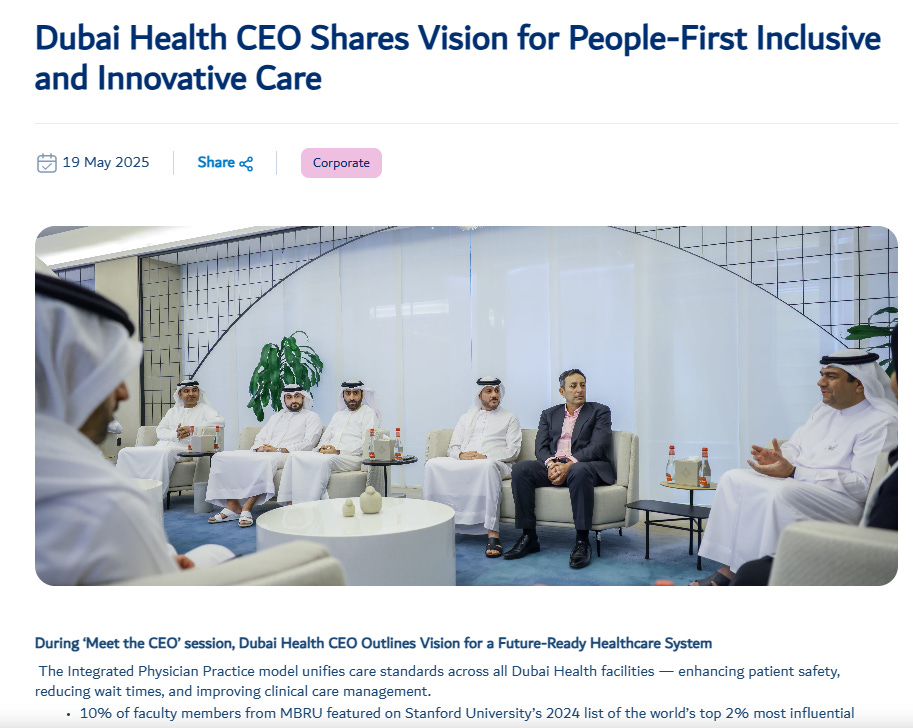The West Built Healthcare the Middle East Is Rebuilding It
My thoughts on the future of health #32
I fell into a sandstorm recently after quote-tweeting Anthony Linares on Twitter.
For context, here’s what he said:
“I think UAE is the future of healthcare.”
That statement sent my thoughts spiraling into the future of healthcare and preventative medicine. Not because it’s controversial, but because it’s becoming undeniable, i know because i’ve seen it myself.
Dubai doesn’t have tests or treatments the West doesn’t have. What Dubai has is something far more valuable: the infrastructure and willingness to actually deploy them.
The Western world hit a point of complacency. Because we pushed so many early innovations in healthcare, we feel ahead like that gifted friend who takes his foot off the pedal once he thinks he’s already won. When major breakthroughs happen in fields like physics, people start to believe they’ve reached the edge of what’s possible. But anyone paying attention knows that biology is still in its infancy.
The Middle East is investing early into longevity, speed, efficiency, depth, and preventative care. They’re pulling top doctors out of the West because they understand what’s coming. Eventually, Dubai and the UAE will become a global private superpower for healthcare. The place the richest people fly to when they want results, not red tape.
But it’s not just Dubai. Indonesia is quietly building something similar. And both are proving the same principle: money flows where talent goes.
Infrastructure Over Innovation Theater
The UAE has poured billions into medical infrastructure. Hospitals, diagnostic labs, stem-cell centers, AI-driven health hubs. They’ve partnered with the Mayo Clinic, Cleveland Clinic, Moorfields, and King’s College London while building local genomic and longevity institutes.
The UAE Vision 2031 and Dubai Health Strategy 2026 are centered on precision medicine, prevention, and lifespan extension. It’s not about inventing new technology. It’s about using existing technology faster and better.
In extreme cases, advanced cancer, rare disorders, the UAE doesn’t just rely on internal systems. They outsource globally. Patients and elite athletes are sent to world-class specialists in Heidelberg, Germany, or top-tier oncology and regenerative centers across Europe and the U.S. They bring in or collaborate with the superstars of each field, ensuring access to the most advanced care available anywhere.
It’s not nationalism. It’s optimization. A global network designed to get results, fast.
The Medical Sandbox: Where Innovation Moves at the Speed of Capital
Here’s where things get interesting.
Both Dubai and Indonesia have created what are called medical sandboxes—regulated zones where bio-innovation can move without drowning in bureaucracy. These are controlled environments where new technologies, treatments, and diagnostic tools can be tested under regulatory supervision, but without the decade-long approval processes that plague the West.
Dubai Healthcare City: The World’s Largest Healthcare Free Zone
Established in 2002, Dubai Healthcare City (DHCC) is the world’s first and largest healthcare free zone. It’s a self-contained ecosystem that brings together hospitals, clinics, research centers, and medical education institutions under one regulatory umbrella.
What makes DHCC unique is its regulatory flexibility. Companies can test cutting-edge medical technologies, AI-driven diagnostics, regenerative medicine, personalized genomics
Without the typical bureaucratic obstacles. The free zone operates under its own regulatory framework, separate from the UAE’s broader healthcare system, allowing for rapid iteration and deployment.



